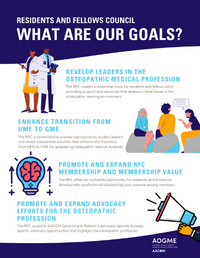Residents & Fellows Council

The AOGME Residents and Fellows Council (RFC) was established in 2018 to develop future leaders in the osteopathic profession by creating a community and forum for residents and fellows to connect, collaborate and learn.
The AOGME RFC's purpose is to:
- Provide a home for residents and fellows to come together, exchange ideas and network
- Serve as a platform for residents and fellows to voice their ideas and concerns to GME leaders
- Develop future leaders
- Promote well-being along the continuum of GME
- Support advocacy efforts that address the needs of medical trainees
GME News
Exploring GME Development Strategies in Underserved and Community-Based Settings
In a pre-conference workshop held on April 16, 2024, national osteopathic graduate medical education (GME) experts and leaders convened to discuss GME development strategies in underserved and community-based settings. The event tackled GME funding at the federal and state level, recruitment of faculty, mechanisms to sustain programs and meet accreditation requirements, Osteopathic Recognition and more.
The workshop commenced with a keynote address by Capt. Paul Jung, MD, MPH, FACPM, director, Division of Medicine and Dentistry, Bureau of Health Workforce, Health Resources and Services Administration (HRSA), who shed light on projected workforce shortages in healthcare fields by 2035 and the pivotal role played by HRSA) programs such as Teaching Health Center Graduate Medical Education (THCGME). Dr. Jung also provided insights into diverse funding opportunities available at federal and state levels.
Tabletop discussions on GME finance, led by an expert panel including Lori Rodefeld, MS; Russell Maier, MD; Alan Douglass, MD; Ted Epperly, MD; and Ward Stevens, DHSc, offered participants an interactive platform to explore state funding sources, the impact of hospital types on GME financing, and the funding structures of THCGME.
Recruitment and retention of GME faculty emerged as a crucial topic presented by Russell Maier, MD, and David Schmitz, MD. Their presentations outlined effective strategies for faculty development, community-engaged recruitment, and succession planning, ensuring program sustainability and leadership continuity.
Another engaging session centered on communicating the value of GME to stakeholders such as C-Suite executives, state legislators, and board members. Participants honed their skills in articulating GME value propositions, employing storytelling techniques, and fostering enduring relationships with institutional and community leaders. At the end of this session, participants walked away with an elevator speech on how to articulate the value of GME to various decision makers.
Richard Terry, DO, shared insights on navigating the challenges and pitfalls in GME development, emphasizing the critical role of adequate funding, awareness of accreditation risks, and the need for robust infrastructure support. This was followed by a panel discussion on new program development, and invaluable lessons learned, and best practices gleaned from panelists’ experiences.
David Schmitz, MD, further explored the significance of identifying and nurturing GME champions, elucidating their varied roles, the importance of building supportive teams, and strategies for champion development and support.
The workshop also addressed the complexities surrounding Osteopathic Recognition, with speakers Marina Shapiro, PhD; Richard Terry, DO; and Alegneta Long, MPP, offering insights into barriers faced by programs seeking recognition, the value of osteopathic principles in healthcare, and survey findings shedding light on institutional challenges.
Concluding the event was a panel discussion on sustaining GME programs, navigating challenges, and meeting Accreditation Council for Graduate Medical Education requirements. Elizabeth Zmuda, DO; David Schmitz, MD; Lori Rodefeld, MS; and Ted Epperly, MD, shared practical tips for succession planning, ensuring good governance, and fostering continuous improvement to maintain program quality and accreditation.
The AOGME pre-conference workshop distilled invaluable insights on GME development. The top five takeaways are:
Employ transparent communication with executives and legislators to showcase the value of GME
Foster strategic partnerships—retaining faculty hinges on development opportunities and a supportive environment
Ensure program stability by understanding federal and state funding sources
Long-term sustainability requires succession planning and nurturing emerging leaders
Continuous evaluation and improvement drive program excellence and the ability to meet evolving needs
View the PowerPoint deck of the preconference workshop presentations: AOGME Precon Compiled PPT 2024.pdf. Email us at aogme@aacom.org if you are interested in more information on GME development.
Please visit AACOM GME Clearinghouse for more information and resources.


Leave a comment